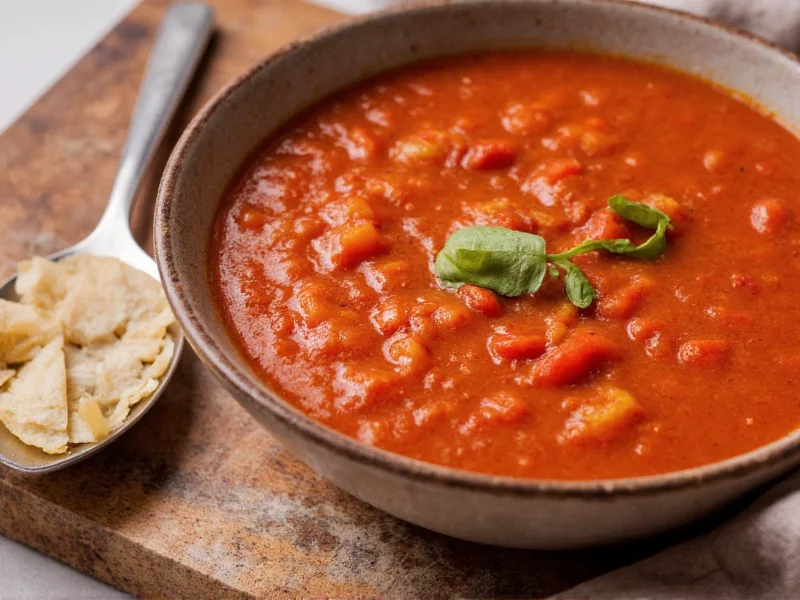When you're craving comforting tomato soup but lack fresh produce, canned tomatoes are your secret weapon. Unlike seasonal fresh tomatoes that vary in sweetness and acidity, canned varieties offer reliable flavor depth perfect for soups. The canning process locks in peak-season ripeness while breaking down cell structures for a naturally smoother texture—eliminating the need for lengthy simmering.
Why Canned Tomatoes Outperform Fresh for Soup
Canned tomatoes undergo thermal processing that intensifies their umami compounds while reducing water content. This creates an instant flavor foundation that would take hours to develop with fresh tomatoes. San Marzano DOP varieties, often found in cans, contain lower acidity and higher sugar content—ideal for balanced soup without excessive sweetening.
| Type of Canned Tomato | Best For Soup | Texture Result |
|---|---|---|
| Whole Peeled | Classic smooth soup | Creamiest consistency |
| Crushed | Quick preparation | Slightly textured |
| Diced | Chunky vegetable soup | Distinct tomato pieces |
| Tomato Puree | Extra-concentrated flavor | Ultra-smooth base |
Essential Ingredients Checklist
For the best easy tomato soup recipe with canned tomatoes, gather these pantry staples:
- 28-ounce can whole peeled tomatoes (preferably San Marzano)
- 1 medium yellow onion, finely diced
- 3 cloves garlic, minced
- 2 tablespoons olive oil or butter
- 1 teaspoon sugar (balances acidity)
- ¼ cup heavy cream (optional for creamy tomato soup)
- Fresh basil or oregano for finishing
Step-by-Step Preparation
Follow this how to make tomato soup from canned tomatoes method for foolproof results:
- Sauté aromatics: Cook onions in olive oil over medium heat until translucent (5-7 minutes). Add garlic during the last minute to prevent burning.
- Build flavor foundation: Pour in canned tomatoes with their juice. Use kitchen scissors to snip tomatoes directly in the can for even size.
- Simmer gently: Bring to a simmer, then reduce heat to low. Add sugar and herbs. Cook uncovered for 15-20 minutes—never boil vigorously as this creates metallic notes.
- Blend smoothly: Use an immersion blender directly in the pot for safest results. For extra silkiness, strain through a fine-mesh sieve.
- Finish perfectly: Stir in cream (if using) off-heat to prevent curdling. Adjust seasoning with salt and freshly ground pepper.
Pro Techniques for Restaurant-Quality Results
Elevate your homemade tomato soup with canned tomatoes using these chef-tested methods:
- Acidity balancing: If your soup tastes too sharp, add ¼ teaspoon baking soda instead of extra sugar—it neutralizes acid without sweetness.
- Flavor layering: Deglaze the pot with 2 tablespoons tomato paste after sautéing onions. Cook until paste darkens slightly for deeper umami.
- Texture control: For ultra-smooth soup without straining, add tomatoes through a food mill during blending.
- Storage secret: Tomato soup tastes better the next day. Freeze portions with a thin layer of olive oil on top to prevent freezer burn.
Popular Variations to Try
Customize your canned tomato soup with these delicious twists:
Creamy Roasted Garlic Version
Roast 1 whole garlic head with olive oil at 400°F until soft. Squeeze cloves into soup during blending. Substitute coconut milk for cream in vegan tomato soup with canned tomatoes.
Spicy Arrabbiata-Style
Add ½ teaspoon red pepper flakes with the garlic. Finish with fresh parsley and a drizzle of chili oil for spicy tomato soup using canned tomatoes.
Chunky Garden Vegetable
Add ½ cup diced carrots and celery with the onions. Use diced canned tomatoes and simmer 5 minutes longer for tomato vegetable soup with canned tomatoes.
Troubleshooting Common Issues
Solve these frequent problems when making tomato soup recipe without fresh tomatoes:
Soup Tastes Too Acidic
Balance with ¼ teaspoon baking soda (not additional sugar). The reaction will fizz slightly—this is normal. Alternatively, add 1-2 tablespoons grated carrot which contains natural sugars.
Soup Has Canned Tomato Flavor
Simmer 5-10 minutes longer with a Parmesan rind. The umami compounds will mask metallic notes. A splash of sherry vinegar (½ teaspoon) also brightens flat flavors.
Soup Is Too Thin
Create a beurre manié: Mix equal parts softened butter and flour until paste-like. Whisk small pieces into simmering soup until desired thickness. Avoid cornstarch which creates unnatural glossiness.
Why This Method Beats Canned Soup
Commercial canned soups often contain unnecessary additives and excessive sodium. Your quick tomato soup recipe with pantry staples controls every ingredient—typically cutting sodium by 60% while delivering brighter, fresher flavor. The entire process takes less time than heating store-bought versions when you use quality canned tomatoes as your foundation.
Final Thoughts
Mastering tomato soup with canned tomatoes unlocks year-round comfort food possibilities. The key lies in understanding how to maximize the concentrated flavor of quality canned tomatoes while balancing their natural acidity. With these techniques, you'll create restaurant-worthy soup that surpasses expensive store-bought versions—all from pantry staples in under 30 minutes. Keep this easy canned tomato soup recipe bookmarked for those nights when only warm, comforting soup will do.











 浙公网安备
33010002000092号
浙公网安备
33010002000092号 浙B2-20120091-4
浙B2-20120091-4